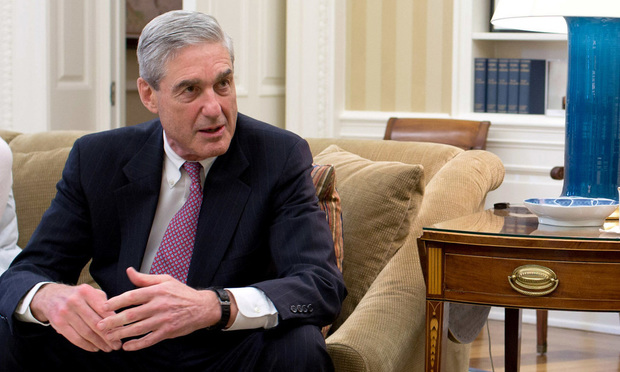Release of Mueller Report Should End the Second-Guessing About Criminality
The narrative reflects a psycho-drama worthy of a Grade B movie were the stakes not about the operation of the Oval Office and the governance of the nation.
April 23, 2019 at 11:20 AM
6 minute read
 Robert Mueller. Photo: White House/Pete Souza
Robert Mueller. Photo: White House/Pete Souza
The anti-climactic public release of the Mueller Report after two years, with some redactions and the AG Barr press conference, teases out answers to some queries and churns fresh unsettled ones. For example, what's next and where?
Competing interpretations aside, the yield across the spectrum appears to be a mixture of anxious disappointment, severe angst and deep unease at some of the sordid revelations. The direct and in-between-the-lines narrative reflects a psycho-drama worthy of a Grade B movie, were the stakes not about the operation of the Oval Office and the governance of the nation. The nation seems trapped in its own place in history and time, spinning as it were in a cyclotron with every “breaking news” twitter feed.
Back in 1987, I uttered a “step back” phrase, figuratively, to a lawyer arguing a case at the Court of Appeals. He took me literally and threw himself into reverse by backing away from the lectern while still facing the court. Then-Chief Judge Wachtler leaned forward, summoning him back with this quip—“pay no attention to Judge Bellacosa, as you still have reserved argument time.” The lighthearted anecdote is recalled to suggest the peril of anyone reading yet another commentary on this un-ending national saga.
Some years ago, Judge Wachtler uttered the renowned bon mot that prosecutors can indict a ham sandwich if they so choose. In 1940, the then-U.S. Attorney General Robert Jackson more seriously instructed the nation's prosecutors on the weighty responsibility of prosecutorial decision-making and accountability—the serious consequences of any criminal prosecution that sets in motion the grinding apparatus of the wheels in the machine of official accusations against individuals. These temporal guideposts set my table for stepping back briefly to examine the crossroads that the Mueller Report has led the nation to and where its roaring wake will wash up next.
As a context, Founding President George Washington warned, as he was leaving the public landscape of the young nation, against partisan political camps evolving into ambitious “parties,” His immediate successors, and virtually all politicians since, ignored the warning. Dirty tricks and ad hominem politics became common almost immediately with Adams and Jefferson, and remain the historical reality, worsened and coarsened due to modern modes of instant communication that fuel and inflame.
The culture has even descended into a zero-sum game of intense dislike and distrust of adversaries. A more genteel attitude of a bygone era content to defeat opponents at the polls has fallen by the wayside. Gone too is the efficacious effort to cooperate, and even socialize over a drink or meal.
Critically, the combatants have also jumped the shark for an unsettling ride on the back of the sedate judicial process. That is what makes the more recent mosh pits so different and so ugly compared to the robust challenges of yesteryears. The ace held in the back-pocket is like a dry powder box, at the ready to be aimed at a courthouse to try to undo a losing ballot box result or plead for an assortment of remedies from the bench box. This new stratagem has become an ordinary course of business, with little regard for the side-effects on the political process from “litigazation” and its twin demon—criminalization.
That shift is not healthy for the democratic operation of government and surely was not intended by the founders, especially the nation's premier president. DeTocqueville's surprised observation a few decades later about the tendency for all disputes in the American democratic experiment to end up being litigated in the courts surely could not have imagined that the democratic process itself would end up likewise. Dragging the separate branch neutral magistrate role into vast political brouhahas would have shocked him and disturbed President Washington even more than his wise prophecy concerning the formation of political parties.
The justice system and the criminal end of it do not well serve the nation when they are herniated by this tangled abuse of process. The high-pitched debate over criminal charges or not, arising out of and during the 2016 election cycle, has now produced embarrassing and even scary revelations, but in the end, the unseemly saga should not be examined and resolved under the ham sandwich lens.
Investigations and indictments are about real people, their freedom and reputations, no matter how high or low their status in society and government. The stamp of criminality should, therefore, be resolved formally under respected and tested norms of process informed by prudential judgment of trusted officials. The well-being of the nation itself deserves and requires no less—and individuals deserve the Robert Jackson gold standard of decency and regularity, not curb stone hyperbole, fueled by media or mob-like shouting.
So, a “step back” is in order. If Mr. Mueller and the Justice Department could not together or respectively conclude, after the massive undertaking and deliberation, that a potentially indictable criminal case could not be fairly and responsibly proven on the hugely acquired evidence beyond a reasonable doubt, that should be it in that arena.
Continuing speculation and second-guessing about indictments or criminal conduct as such are unhelpful. That other individuals among the public, government, media or editorialists think otherwise and that the ham sandwich approach should drive the process serves no good civic purpose.
An important caveat is that these observations have nothing to do with, nor do they imply, any foreclosure of the full thrust of Congressional powers to investigate within its range of authority, nor of its discrete impeachment authority. If those invested with that unique authority within the constitutional structure choose to take those paths, then those processes must be allowed to play themselves out in the proper forums, and without whatever fallout they bring to the ultimate forum—the court of public opinion at the polls.
The nation's audiences deserve to know, however, that these discrete and awesome political pathways are not about law and legitimate legal process in the judicial sense or criminal realms. They are about the exercise of raw political power by the numbers of counting votes in Congress and then at the polls—ask House-impeached Presidents Andrew Johnson and Bill Clinton who were both acquitted, not “exonerated,” by respective Senates. Those extraordinary powers, however, must be exercised and resolved in the Capitol chambers, not judicial ones, and especially not in continuing media/cable debates or in focus groups.
Joseph Bellacosa was an associate judge on the Court of Appeals.
This content has been archived. It is available through our partners, LexisNexis® and Bloomberg Law.
To view this content, please continue to their sites.
Not a Lexis Subscriber?
Subscribe Now
Not a Bloomberg Law Subscriber?
Subscribe Now
NOT FOR REPRINT
© 2025 ALM Global, LLC, All Rights Reserved. Request academic re-use from www.copyright.com. All other uses, submit a request to [email protected]. For more information visit Asset & Logo Licensing.
You Might Like
View All
FTC's Shaoul Sussman Discusses Draft Merger Guidelines With Skadden
18 minute read
Trending Stories
- 1Troutman Pepper, Claiming Ex-Associate's Firing Was Performance Related, Seeks Summary Judgment in Discrimination Suit
- 2Law Firm Fails to Get Punitive Damages From Ex-Client
- 3Over 700 Residents Near 2023 Derailment Sue Norfolk for More Damages
- 4Decision of the Day: Judge Sanctions Attorney for 'Frivolously' Claiming All Nine Personal Injury Categories in Motor Vehicle Case
- 5Second Judge Blocks Trump Federal Funding Freeze
Who Got The Work
J. Brugh Lower of Gibbons has entered an appearance for industrial equipment supplier Devco Corporation in a pending trademark infringement lawsuit. The suit, accusing the defendant of selling knock-off Graco products, was filed Dec. 18 in New Jersey District Court by Rivkin Radler on behalf of Graco Inc. and Graco Minnesota. The case, assigned to U.S. District Judge Zahid N. Quraishi, is 3:24-cv-11294, Graco Inc. et al v. Devco Corporation.
Who Got The Work
Rebecca Maller-Stein and Kent A. Yalowitz of Arnold & Porter Kaye Scholer have entered their appearances for Hanaco Venture Capital and its executives, Lior Prosor and David Frankel, in a pending securities lawsuit. The action, filed on Dec. 24 in New York Southern District Court by Zell, Aron & Co. on behalf of Goldeneye Advisors, accuses the defendants of negligently and fraudulently managing the plaintiff's $1 million investment. The case, assigned to U.S. District Judge Vernon S. Broderick, is 1:24-cv-09918, Goldeneye Advisors, LLC v. Hanaco Venture Capital, Ltd. et al.
Who Got The Work
Attorneys from A&O Shearman has stepped in as defense counsel for Toronto-Dominion Bank and other defendants in a pending securities class action. The suit, filed Dec. 11 in New York Southern District Court by Bleichmar Fonti & Auld, accuses the defendants of concealing the bank's 'pervasive' deficiencies in regards to its compliance with the Bank Secrecy Act and the quality of its anti-money laundering controls. The case, assigned to U.S. District Judge Arun Subramanian, is 1:24-cv-09445, Gonzalez v. The Toronto-Dominion Bank et al.
Who Got The Work
Crown Castle International, a Pennsylvania company providing shared communications infrastructure, has turned to Luke D. Wolf of Gordon Rees Scully Mansukhani to fend off a pending breach-of-contract lawsuit. The court action, filed Nov. 25 in Michigan Eastern District Court by Hooper Hathaway PC on behalf of The Town Residences LLC, accuses Crown Castle of failing to transfer approximately $30,000 in utility payments from T-Mobile in breach of a roof-top lease and assignment agreement. The case, assigned to U.S. District Judge Susan K. Declercq, is 2:24-cv-13131, The Town Residences LLC v. T-Mobile US, Inc. et al.
Who Got The Work
Wilfred P. Coronato and Daniel M. Schwartz of McCarter & English have stepped in as defense counsel to Electrolux Home Products Inc. in a pending product liability lawsuit. The court action, filed Nov. 26 in New York Eastern District Court by Poulos Lopiccolo PC and Nagel Rice LLP on behalf of David Stern, alleges that the defendant's refrigerators’ drawers and shelving repeatedly break and fall apart within months after purchase. The case, assigned to U.S. District Judge Joan M. Azrack, is 2:24-cv-08204, Stern v. Electrolux Home Products, Inc.
Featured Firms
Law Offices of Gary Martin Hays & Associates, P.C.
(470) 294-1674
Law Offices of Mark E. Salomone
(857) 444-6468
Smith & Hassler
(713) 739-1250








